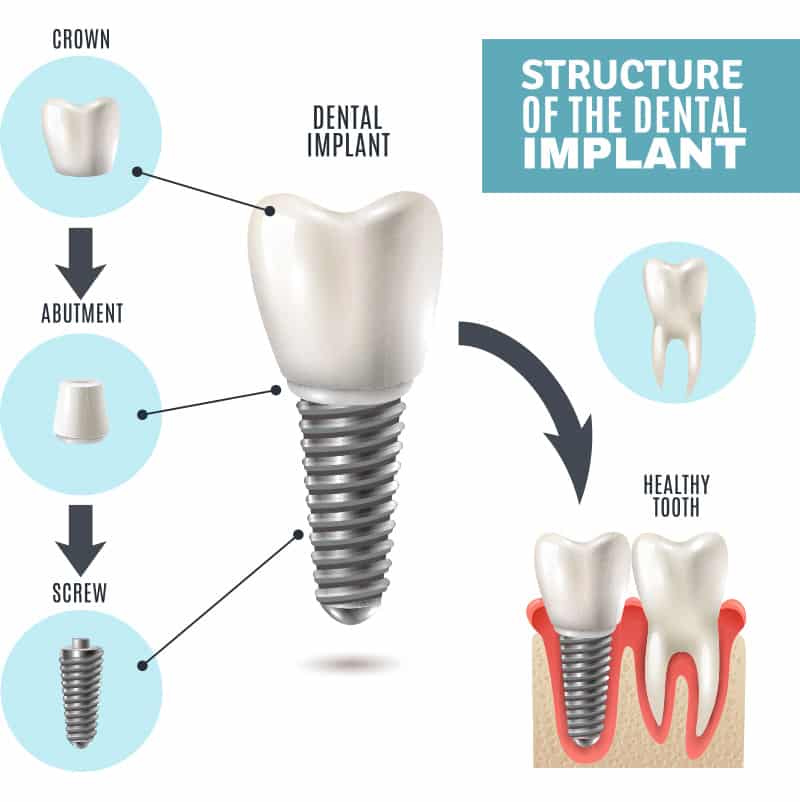BOOK YOUR APPOINTMENT | 416 766 2853
- Home
- Dental Implants
Dental Implants in Toronto – Restore Your Smile
Have you lost a tooth to decay, injury or gum disease? Dental implants are an excellent solution for the replacement of your missing teeth. Implants look and feel just like your own natural teeth and have been performed successfully for decades. At his West Toronto dental clinic, Dr. Kostirko has been treating patients who wish to have a more permanent solution for their missing teeth with dental implants for over 20 years.
Teeth implants are placed in stages. Dr. Kostirko will first place the base of the implant, the titanium post, via a dental implant surgery. Titanium is most often used for various implants because it is compatible with your body. Once the implant surgery takes place the implant is left to heal and fuse with your bone – this process is referred to as osseointegration. This takes place over a period of several months and creates a strong bond for the base of your implants. At this point, abutments are secured to the posts of your implants which will serve as connectors between the implants and the crowns. Crowns are the only portion of implants that are visible. Abutments make dental crowns appear as if they rise up from the gum line, just like your natural teeth.
To place implants successfully, there must be enough density in the jawbone. During your initial implant consultation Dr. Kostirko will assess if you have enough density in your jaw bone for dental implants to be successful. If not, then bone grafting may be needed to prepare you for implant surgery.
Dental implant placement is a short surgical procedure that lasts approximately 20 to 30 minutes in most cases. Dr. Kostirko provides local anesthetic in the most gentle way possible so that there is no discomfort during the treatment. In some cases our patients also request a stronger form of sedation for the implant surgery. Our patients frequently tell us they have almost no discomfort even on the same day, afternoon or evening after dental implant surgery. Patients usually take a general pain relief medication such as Advil or Tylenol Extra Strength regularly every 6 hours after treatment. During Dr. Kostirko’s post surgery follow-up care call many of our patients expressed they were surprised the procedure was much more straightforward than what they had imagined.
Dental Implant Facts
- Are the most advanced tooth replacement system ever devised
- Help preserve the jawbone to prevent the appearance of premature aging
- Look and function like natural teeth
- Are placed and restored at our clinic with minimal discomfort. Most of our patients report minimal to no discomfort.
- Improve your comfort, appearance, and speech.
- Have over a 95% success rate.
- Allow you to eat the foods you love
- Never develop tooth decay
- Allow you to talk, smile, and laugh with confidence
- Represent a conservative treatment option – your adjacent teeth are left untouched unlike traditional crown and bridge treatments.
- Never require root canals
- Can provide great stability for dentures and prevent bone loss caused by dentures
- Can completely eliminate the need for a denture
- Can help people of any age
- Are natural looking and very long-lasting
What Type of Prosthesis are Available?
Implants are versatile, and though on their own they appear just like your own natural teeth, they may also be used to support other dental appliances (prosthesis) such as:
- A single prosthesis (crown) is used to replace one missing tooth – each prosthetic tooth attaches to its own implant.
- A partial prosthesis (fixed bridge) can replace two or more teeth and may require only two or three implants.
- A complete dental prosthesis (fixed bridge) replaces all the teeth in your upper or lower jaw. The number of implants varies depending upon which type of complete prosthesis (removable or fixed) is recommended.
- A removable prosthesis (over denture) attaches to a bar or ball in socket attachments, whereas a fixed prosthesis is permanent and removable only by a dental professional.

